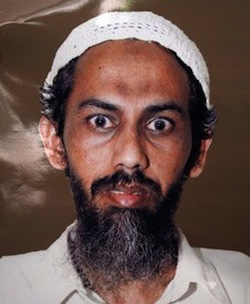
| Long look at the bomb-builder of the Bali terrorist attack. Worth noting the connections to Abbottabad and his proximity to bin Laden for a time. |
A transcript of the Umar Patek's interrogation obtained by The Associated Press offers extraordinary detail of the Bali plot just days before Patek -- a radical once Southeast Asia's most-wanted bomb-making suspect -- goes on trial in Jakarta for his alleged role in the nightclub attack that killed 202 people.
Patek, known as "Demolition Man" for his expertise with explosives, says he and other conspirators stashed the 1,540-pound (700-kilogram) bomb in four filing cabinets, loaded them in a Mitsubishi L300 van along with a TNT vest bomb. The van was detonated outside two nightclubs on Bali's famous Kuta beach on Oct. 12, 2002. Most of those killed were foreign tourists.
Although homemade bombs are easily assembled by militants all over the world, making such powerful devices as those used in Bali -- and using such unsophisticated equipment -- would have taken enormous amount of care and expertise.
Patek, 45, goes on trial Monday following a nine-year flight from justice that took him from Indonesia to the Philippines to Pakistan, reportedly in pursuit of more terrorism opportunities. He was finally caught in January 2011 in the same Pakistani town where US Navy Seals would kill Osama Bin Laden just a few months later.
| Boy howdy, what a coincidence. Wonder if he and Binny shared the community pool? |
| Should have been extradited to Diego Garcia... |
Patek is charged with premeditated murder, hiding information about terrorism, illegal possession of explosives and conspiracy to commit terrorism, and now faces a possible death sentence as well. The indictment also accuses Patek of providing explosives for a string of Christmas Eve attacks on churches in 2000 that claimed 19 lives.
Interviews with intelligence officials in Indonesia and the Philippines, the interrogation report and other documents obtained by the AP reveal the peripatetic life Patek led after the Bali attacks as he ranged widely and freely, often without passing through immigration checks, while allegedly passing along his bomb-making skills to other terrorists.
Patek, whose real name is Hisyam bin Alizein, is the son of a goat meat trader. He went to computer school and learned English before being recruited into Jemaah Islamiyah by Dulmatin, a fellow militant who was gunned down by Indonesian police in March 2010.
After his arrest, Patek told his interrogators that he learned to make bombs during a 1991-1994 stint at a militant academy in Pakistan's Sadda province, and later in Turkhom, Afghanistan, where bomb-making courses ranged "from basic to very difficult."
He said he was living in Solo, Indonesia, when mastermind Imam Samudra approached him to make a bomb in Bali. He agreed and flew to Denpasar, Bali's capital, and was taken to a rented house.
"In one room of the house, I began to mix the explosive ingredients, which were already in the rental house," he said. "For about three weeks, I made the explosive ingredients into black powder with the assistance of Sawad (a co-conspirator). For tools used in the mixing of the ingredients, I used (a) scale that will usually be used in a food store, rice ladle and plastic bags as containers."
Dulmatin separately worked on the electronic circuits, which were later attached as detonators to the bombs packed into the filing cabinets.
"When we were lifting the filing cabinets into the white L300 van, an explosion occurred which was caused by friction of the filing cabinet with the floor of the room, because the floor still had some leftover black powder on it," he said.
Patek left Bali a few days before the attacks were carried out.
Afterward, officials said, Patek and Dulmatin went to the Philippines and allegedly joined forces with the local extremist group Abu Sayyaf, spending the next several years training militants and plotting attacks, including against US troops in the Philippines.
Meanwhile, Imam Samudra and two other masterminds of the Bali attacks -- brothers Amrozi Nurhasyim and Ali Ghufron -- were caught, tried and executed.
Patek returned to Indonesia in June 2009, living in various rented houses in Jakarta. He held several meetings with radicals and aspiring militants at home and held assault rifle and bomb-making training sessions at a beach in Banten near Jakarta.
But Patek's heart was set on going to Afghanistan to fight alongside the Taleban or other extremist groups, said Ansyaad Mbai, Indonesia's anti-terrorism chief. He told the AP that Patek intended to continue his fight in a more defined battleground with a larger radical group, and refused Dulmatin's offer to become an instructor in a new militant camp in Indonesia's Aceh province.
"He wanted to fight with a larger extremist group, and Afghanistan was the ideal battleground for him," Mbai said.
But to reach Afghanistan, he would have to go to Pakistan first. A police investigator said that a 37-year-old Pakistani in Indonesia, Nadeem Akhtar, helped Patek get a Pakistani visa from his embassy in Jakarta.
| Why not just print up a fresh one? |
Mbai did not rule out the possibility that Patek went to Abbottabad to not only gain a foothold into Afghanistan but also to obtain funds for setting up a militant training camp in Jolo in southern Philippines. But before he could make much progress or meet Bin Laden, he was caught.
Patek's trial not only seeks justice for the Bali bombings, but also is a coup for intelligence officials. He is believed to have valuable information about Al-Qaeda and its links with Jemaah Islamiyah, which was founded by Indonesian exiles in Malaysia in the early 1990s.
The Bali bombing remains JI's most spectacular attack. Though there have been several others since, but none as deadly. Analysts credit a crackdown that has netted more than 700 militants since 2000, including the death of several key leaders in police action.

 In a potentially consequential blow to Indonesia's counter-terrorism efforts, Islamic cleric Abu Bakar Bashir has had his sentence cut by six years on appeal. The 73-year-old's trial, for funding and planning a
In a potentially consequential blow to Indonesia's counter-terrorism efforts, Islamic cleric Abu Bakar Bashir has had his sentence cut by six years on appeal. The 73-year-old's trial, for funding and planning a  Three Islamic
Three Islamic  Indonesia has denied final appeals for three men on death row convicted for deadly bombings on the island of Bali in October, 2002. Chad Bouchard reports from Jakarta.
Indonesia has denied final appeals for three men on death row convicted for deadly bombings on the island of Bali in October, 2002. Chad Bouchard reports from Jakarta.
 LAWYERS for three of the Bali bombers will today return to court in a last-ditch attempt to prevent their execution. Denpasar District Court is due to hold three case review hearings - for the so-called smiling assassin
LAWYERS for three of the Bali bombers will today return to court in a last-ditch attempt to prevent their execution. Denpasar District Court is due to hold three case review hearings - for the so-called smiling assassin  In this part of Indonesias central Java island, most people quietly eke out meager livings from the land and sea. But this region has become notorious, after three brothers brought shame to their village. They helped carry out the bombings on the resort island of Bali in October 2002 that killed 202 people, many of them foreign tourists. Here in the sleepy village of Tenggulun, those three brothers lived and thrived. Now
In this part of Indonesias central Java island, most people quietly eke out meager livings from the land and sea. But this region has become notorious, after three brothers brought shame to their village. They helped carry out the bombings on the resort island of Bali in October 2002 that killed 202 people, many of them foreign tourists. Here in the sleepy village of Tenggulun, those three brothers lived and thrived. Now